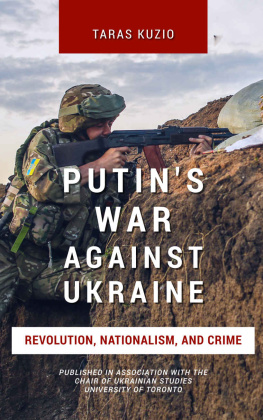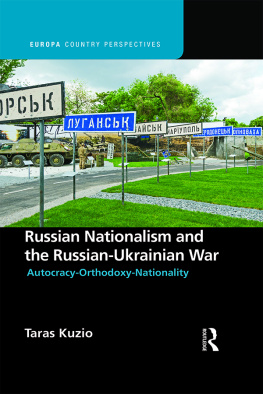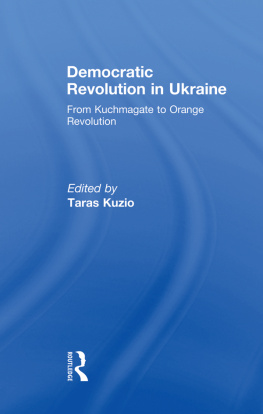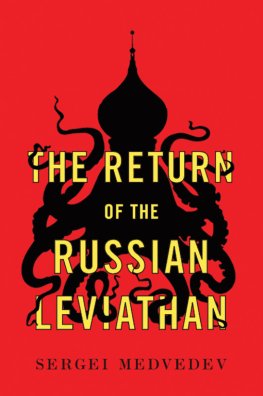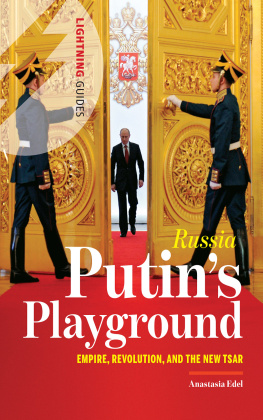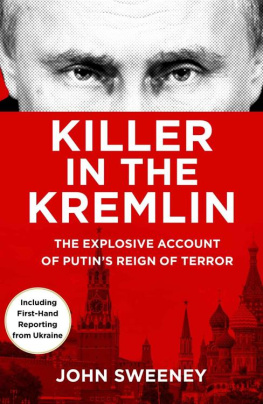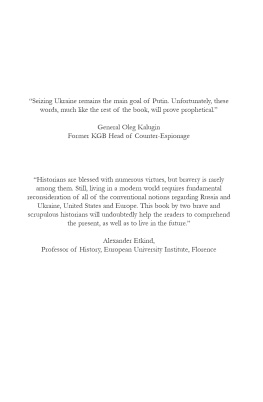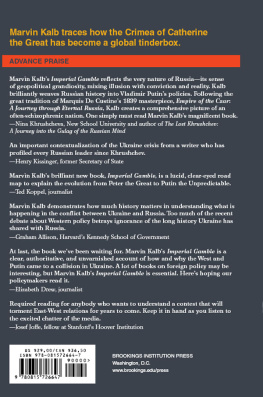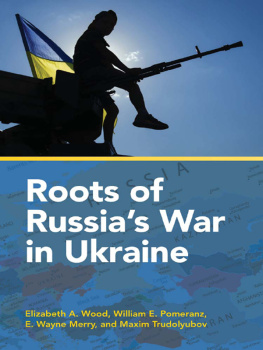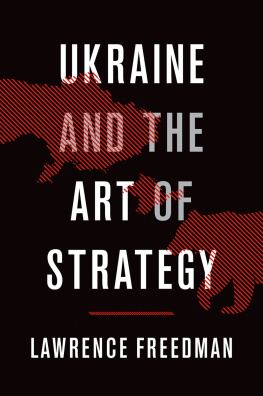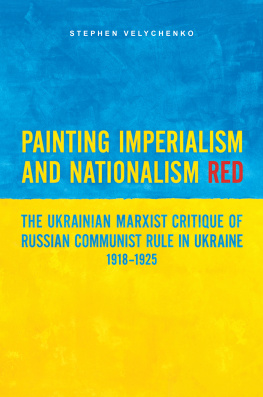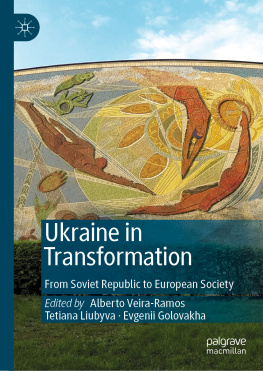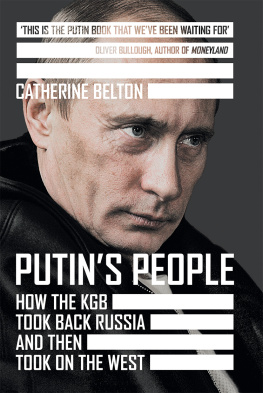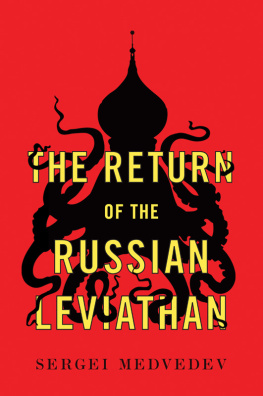PUTINS
WAR
AGAINST
UKRAINE
REVOLUTION, NATIONALISM, AND CRIME
PUBLISHED IN ASSOCIATION WITH THE CHAIR OF UKRAINIAN STUDIES, UNIVERSITY OF TORONTO
Copyright 2017 by Taras Kuzio
All rights reserved. This book or any portion thereof may not be reproduced or used in any manner whatsoever without the express written permission of the publisher except for the use of brief quotations in a book review.
The photograph of a Ukrainian soldier in combat on the front cover is reproduced courtesy of Noah Brooks who is a documentary photographer from Point Pleasant, New Jersey, USA.Noah began his photography taking photos of the ocean along the New Jersey Shore, then moved on to photograph protests around the United States. After the war broke out in Ukraine, Noah felt compelled to document the story of Euromaidan Revolution protesters leaving the barricades in Kyiv to fight in combat on the front line in Donbas. He can be reached at noahbrooks99@gmail.com.
The remaining photographs were taken by Taras Kuzio and Natali Prylutska (Dziuba). After her brother-in law Dmytro Kuzmin was killed in combat in July 2014, Natali decided to become a civil society volunteer and since then has been delivering food, uniforms, boots, medicines, night vision, and sleeping bags 2-3 times each month to Ukrainian soldiers on the front line. When the photograph was taken is given in brackets.
Published in association with the Chair of Ukrainian Studies, University of Toronto
www.betweeneuropeandrussia.com
There is no doubt as to the Austro-German origin of the legend of the existence of a separate Ukrainian nation.
Prince Alexandre Wolkonsky, The Ukraine Question (1920)
Modern Ukraines borders also do not correspond to historic ethnographic limits. Seven million Russians and, probably, no less Russianised Ukrainians live in Ukraine, and it would be more appropriate to transfer several Ukrainian oblasts to Russia. We are not even talking about the flagrant injustice of giving Crimea to UkraineIf a question about the independence of Ukraine really arose, its boundaries should be revised. In such a case, Ukraine should cede the following territories to Russia: (a) Crimea, (b) Kharkiv, Donetsk, Luhansk, and Zaporizhzhya oblasts (where the Russian population dominates), and (c) Odesa, Mykolayiv, Kherson, Dnipropetrovsk (Dnipro), and Sumy oblasts (where the population is Russified enough and which were historically developed by the Russian state).
Russian Patriots, A NationSpeaks (1970)
Maybe it will be necessary to have a referendum in each region and then ensure preferential and delicate treatment of those who would want to leave. Not the whole of Ukraine in its current formal Soviet borders is indeed Ukraine. Some regions on the left bank (of the river Dnipro) clearly lean more towards Russia. As for the Crimea, Khrushchevs decision to hand it over to Ukraine was totally arbitrary.
Alexander Solzhenitsyn, Rebuilding Russia (1990)
The outcome of the referendum should be calculated separately in each region and each region must decide for itself where it stands.
Alexander Solzhenitsyn, Appeal on the Ukrainian Referendum on Independence (1991)
Our concerns are understandable because we are not simply close neighbours but, as I have said many times already, we are one people. Kyiv is the mother of Russian cities. Ancient Rus is our common source and we cannot live without each other.
President Vladimir Putin (2014)
TABLES AND BOXES
- Table 3.1. Coincidence or Planned Insult?
Significant Dates in Russias War Against Ukraine - Table 5.1. Illicit Financial Flows from Ukraine
(in millions of U.S. dollars, nominal) - Table 11.1. The Odesa Conflict on 2 May 2014:
A Chronology of What Took Place
MAPS
Courtesy of Paul Robert Magocsi, Chair of Ukrainian Studies, University of Toronto.
Courtesy of the National Security and Defence Council of Ukraine.
ABBREVIATIONS, ACRONYMS, AND KEY PERSONALITIES
ABREVIATIONS AND ACRONYMNS
- ATO Anti-Terrorist Operation is the official name for Ukraines military operations in the separatist-controlled Donbas territories.
- Banderite follower of OUN leader Stepan Bandera, but extensively used by Russia for all supporters of Ukrainian patriotism and nationalism.
- Batkivshchyna Fatherland party led by Yulia Tymoshenko (1999-2011, since 2014).
- Berkut riot police in the Ministry of Interior and the snipers who murdered protesters on the Euromaidan, disbanded in spring 2014.
- BYuT Bloc of Yulia Tymoshenko (2002-2011).
- CIS Commonwealth of Independent States, successor organisation to the USSR established in December 1991.
- Colour revolutions the term used to denote democratic revolutions after opposition groups used colours to differentiate themselves (e.g. orange in Ukraine in 2004).
- Cyborg the term applied to Ukrainian troops fighting for a long period of time against Russian and separatist forces in Donetsk Airport.
- DCFTA Deep and Comprehensive Free Trade Agreement, part of the EU-Ukraine Association Agreement.
- Dnipro - the new name for Dnipropetrovsk which this book continues to use.
- DNR Donetsk Peoples Republic, separatist Russian satellite region in Donetsk oblast.
- EaP Eastern Partnership policy established by the EU in 2009 for six former Soviet republics.
- Euromaidan Revolution of Dignity between November 2013-February 2014.
- EU European Union.
- GRU Russian military intelligence whose spetsnaz became known as little green men because they lacked country insignia on their uniforms. Zelyonye chelovechki also refers to outer space humanoids who came from nowhere and nobody knows who they are, a sarcastic response to Russias stubborn denial that these military forces had anything to do with Russia.
- Gubernia administrative region of the Tsarist Russia Empire.
- Holodomor artificial terror-famine unleashed by Joseph Stalin in 1933 that murdered five million people in the Soviet Ukrainian republic and the Ukrainian-populated Kuban region of the northern Caucasus.
- Homo Sovieticus Soviet person used to denote somebody with a Soviet (Sovok) mentality.
- ICC International Criminal Court.
- IRI International Republican Institute.
- Khazayin Lord of the manor, the unbridled sovereign of a region.
- KHRPG Kharkiv Human Rights Protection Group.
- KIIS Kyiv International Institute of Sociological Studies.
- Night Wolves Pro-Vladimir Putin Russian Hells Angels led by Aleksandr (Surgeon) Zaldonstanov whose units are fighting for the separatists in the LNR.
- Komsomol Communist Party of the Soviet Union youth league.
- Krysha a roof, but used as criminal slang to denote political protection for corrupt and criminal activities.
- KPRF Communist Party of the Russian Federation.
- KPRS Communist Party of the Soviet Union.
- KPU Communist Party of Ukraine, banned in 1991, revived in 1993, and de facto defunct since 2014.
- Little Green Men the term used to describe Russian spetsnaz without country insignia who invaded Ukraines Crimea and eastern Ukraine in 2014.
- LNR Luhansk Peoples Republic, separatist Russian satellite region of Luhansk oblast.
- Maskirovka - Russian military deception or hybrid war.
- Mejlis Crimean Tatar unofficial parliament banned by the Russian occupation authorities in April 2016.

